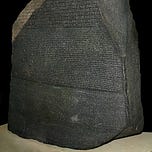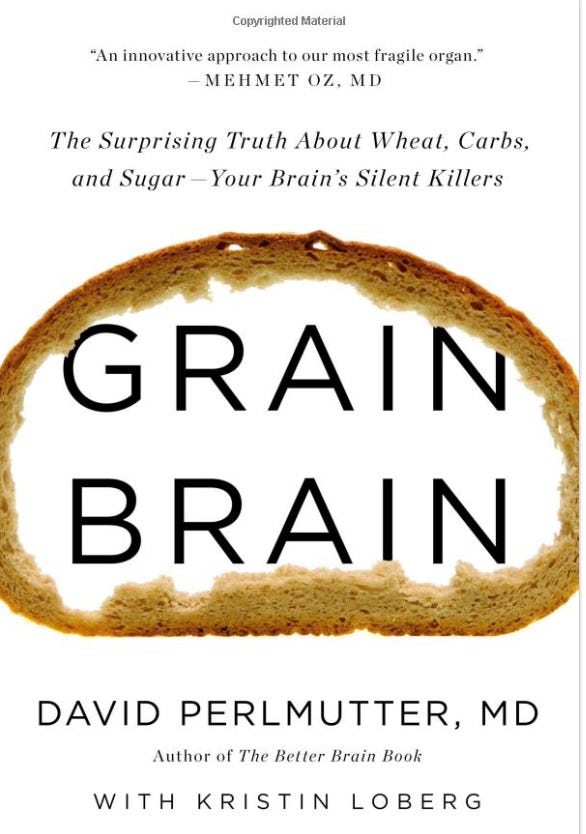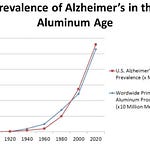Note: the audio above is downloaded from Dr. Mercola’s podcast HERE. I recommend scanning my post, then listening to it at double speed. Be patient with the geeky stuff at the start; the info is compelling. HERE is an excellent summary reference, and THIS one is comprehensive. I worked more than thirty hours on this project.
In 196 BC, the Rosetta Stone was inscribed in three languages, one of them Greek. The 3.5-foot high block was a fragment of a much larger monument that was broken up and used later as building material. It was discovered in 1799 by Napoleon's army in some rubble. In 1822, the scholars decoding it learned that the messages were identical, which gave them a key to the vast body of previously indecipherable Egyptian writing.
When the British won their Egyptian campaign, they took the Stone back to the British Museum, where it remains their most-visited artifact. Twenty years ago, I visited and touched it, but current visitors cannot because it was put in a clear enclosure after someone attacked it with a hammer.
Cancer, heart attacks, obesity, diabetes, autoimmune diseases, and many other inflammatory diseases have increased. Physicians have been beating their brains out for decades trying to solve the mystery of why. Sugar, processed food, pollution, excess calories, lack of exercise, antibiotics, psychiatric drugs, and even microplastics have been credibly blamed. Several factors are probably causal, but a single prime mover seems likely.
I will not address the elephant that entered the room two years ago—the Covid vax/bioweapon. This has caused the average American lifespan to decrease by nearly three (3) years.
To see through the chaos of information about these subjects, review my three principles from Butchered by "Healthcare:"
1) The updated Golden Rule is that those with the gold make the rules, so learning the source of funding explains a lot.
2) If you do not follow the reasoning, someone is likely lying to sell you something. You are as smart as the storyteller, so do not let them fool you. This applies to financial advisors and lawyers as well as to medical studies. You do not need to be an academic to judge complex data—in fact, learning too much detail obscures the truth.
3) Controversy, confusion, and contradictory evidence about small numbers prove that whatever it is does not work. Do not fall into the trap of believing "reasonable people disagree" or "the science is developing." Always remember Rule 1—follow the money.
Mikhaila Peterson had a severe inflammatory disease: juvenile rheumatoid arthritis. She contemplated joint replacements but recovered and did well when she tried a beef-only ketogenic diet.
Her father, Jordan, is a related case. His wife had cancer, he was desperate with anxiety, and he became addicted to the sedative drug clonazepam (Klonopin), a "benzodiazepine" related to Valium. He tried a treatment involving a month of general anesthesia in Russia that nearly killed him. His anxiety was controlled after he started the same diet that healed Mikhaila.
I have a friend who had life-threatening ulcerative colitis. This inflammatory disease is sometimes treated by surgical removal of the entire colon. It works, but the surgery kills about one in twenty and causes other problems, such as eight to ten stools a day.
As her doctors urged her to have the operation, she discovered Peterson's story in the video above. After a month on a carnivore diet, her pain, diarrhea, and bloody stools vanished, and she is in excellent health and still eating beef several years later. She told the surgeons to go to France, as the English say, and was recently able to become pregnant and deliver a healthy baby.
Carnivore advocates explaining their system are HERE, HERE, HERE, HERE, and HERE. Greg Dennis's podcast archive HERE has others. This diet cures obesity and prevents Alzheimer's. Adult onset diabetics lose weight, normalize their blood tests, and are often able to discard their medications.
I tried it for several months and had three weeks of "keto flu" fatigue, but I did well later. This is typical while people are adapting to eating few carbohydrates. I liked the beef, but I developed severe constipation. So I started eating a more mixed diet, emphasizing animal fats and meats. (I reveal what cured my near bowel obstruction later.)
Here is a related perspective from a physician author who sold over a million copies:
Dr. Perlmutter is a neurologist concerned about the phenomenal increase in another inflammatory disease, Alzheimer's. Because the number of cases has risen so rapidly, this form of dementia is no longer regarded as primarily genetic.
Perlmutter presents studies in his book showing that American eating habits cause brain degeneration and other health problems. He emphasizes that consuming grains and other carbohydrates is inflammatory and says this affects far more than the few percent who have celiac disease—possibly half of our population. He recommends changing our diet composition to replace most carbohydrates with animal fats. These ideas are finally becoming accepted:
Studies done more than twenty years ago documented higher mortality rates with carb consumption and, conversely, lower mortality rates with higher fat consumption (and lower risk for cardiovascular disease). I don’t know why we are still talking about the relationship between fat and cholesterol and risk for a cardiovascular event. In a 2017 study in, once again, the highly regarded Lancet journal, researchers from multiple esteemed institutions around the world studied an incredibly large number of individuals aged thirty-five to seventy years (135,335), from eighteen countries, over an average of 7.4 years.31 They carried out very specific assessments of the foods that these individuals ate and evaluated their food choices in terms of macronutrient composition (carbohydrates, protein, and fat), and specifically broke the fat consumption down to evaluate saturated fat, monounsaturated fat, and polyunsaturated fats. Further, they compared the diets to the risk of various endpoints including death, major cardiovascular event, stroke, and heart failure. What the researchers discovered in this extensive study was quite compelling. They noted that higher carbohydrate consumption, comparing the highest consumers of carbohydrate with the lowest consumers of carbohydrate, was associated with risk of death increased by 28 percent.
The amount of total fat, as well as each type of fat, was also dramatically associated with risk for death. Those consuming the highest level of total fat had a reduced risk of death during the study of 23 percent. Risk for death was reduced by 14 percent in those consuming the highest levels of saturated fat, while it was reduced by 19 percent in those consuming high levels of monounsaturated fat, and an incredible 20 percent in those who consumed the highest level of polyunsaturated fat.
Higher consumption of the dreaded saturated fat was also associated with a 20 percent lower risk of stroke, comparing those who consumed the most with those who consumed the least. The authors concluded: “High carbohydrate intake was associated with higher risk of total mortality, whereas total fat and individual types of fat were related to lower total mortality. Total fat and types of fat were not associated with cardiovascular disease, myocardial infarction, or cardiovascular disease mortality, whereas saturated fat had an inverse association with stroke. Global dietary guidelines should be reconsidered in light of these findings.” (Yoho emphasis.)
He also describes the health hazards of statins:
A 2012 report in the American Medical Association's Archives of Internal Medicine, now called JAMA Internal Medicine, revealed that postmenopausal women who took on statin drugs to lower their cholesterol had a nearly 48 percent increased risk of developing diabetes compared to those who were not given the drug. This one example becomes more critical when you consider that becoming diabetic doubles your risk for Alzheimer's disease.
Intermittent fasting. Americans "graze" all the time they are awake, and only ten percent of us eat within twelve hours. Perlmutter recommends eating for at most eight continuous hours each day. Studies compared current practices with this "time-restricted eating." When the same total calories were consumed during a shorter "feeding window," a dietary "free lunch" occurred—automatic weight loss. This practice also reverses heart disease and decreases the chances of inflammatory conditions such as cancer.
Mercola's interview with Dr. Perlmutter is HERE. The tips they discuss include noting that artificial sugars are terrible for health—although they don't raise blood sugar, they increase the risk of stroke, diabetes, and Alzheimer’s.
We are now into the meat of the story. Warning: if you consume this meal, you may no longer be comfortable eating out. Mercola has been presenting evidence that certain oils, particularly synthetic ones, are to blame for nearly every inflammatory disease—cancer, diabetes, heart conditions, and others. Backing for this is his podcast HERE (downloaded for you above), on YouTube HERE, and Grain Brain.
These oils have been widely used since the early 20th century when the Crisco company started a massive marketing campaign to convince the public that their cheaply manufactured grease was health food. From the Crisco website:
In 1911, Crisco – the first-ever shortening made entirely of vegetable oil – was born. Clad in pristine white-paper overwrap, Crisco was seen as a more "pure" and economical alternative to animal fat and butter.
Soon after our first print and radio ads debuted, products flew off of the shelves. The first Crisco cookbook taught Americans all of the innovative ways Crisco could be used – from baking to frying. And so, a cooking revolution was born.
As you read in my last diet post, the "science" promoting these inexpensive modified fats was financed by big Food and ratified by the FDA (Food and Drug Administration). It is the same story as Pharma and drugs—the corrupted ("captured") FDA promotes the profitable lies. Employees go back and forth through the "revolving door" between the regulator and lucrative industry jobs.
Comment: Matt Briggs's recent book title about statistics, "climate change," and other topics is Everything You Believe is Wrong. This also applies to diets and medications in this age of FDA and industry corruption. If you read internet sources, you will find that opinions about healthy fats are contradictory and seem purposefully confusing.
"Saturated" fats come from animals, have all their hydrogen atoms, and cannot readily cause inflammation through a chemical degradation process called oxidation. They are the most healthy. "Monounsaturated" fats such as olive, peanut, and canola oils are missing one hydrogen atom and have little tendency to oxidize. But some "polyunsaturated" (PUFAs) fats in our diet have many hydrogen atoms missing. They are less stable, oxidize easily, and are much more inflammatory. Mercola believes that one of these, linoleic acid, is the worst actor in human nutrition. Fortunately, food labels identify them.
Many studies and opinions have been bought and falsified. For example:
THIS one proclaims, "Consumption of linoleic acid has been associated with lowering the risk of cardiovascular disease and premature death." But at the end, the authors admit: "[We] have received research support from the California Walnut Commission." You will see in the chart below that walnut oil has high linoleic acid content.
WebMD, also bought and paid for, and a jungle of disinformation, says, "Polyunsaturated fats, also called polyunsaturated fatty acids or PUFA, are good fats. They are a type of fat that is good for your heart health."
Here is another truth reversal from verywellhealth.com: "Saturated fats (including a type called trans fat) tend to stay solid and can cause fatty deposits in blood vessels, leading to atherosclerosis ("hardening of the arteries")."
Mercola says the PUFA synthetic oils and their plant-based relatives are the leading cause of inflammatory diseases. Linoleic acid is the one most frequently consumed, and American diets often contain 50 grams of it daily. To improve health, this must be cut as low as possible. Safflower, soy, sesame and corn oils are high in PUFAs, including Omega 6 fatty acids. These are traditionally thought to be "essential" fats that the body cannot manufacture on its own, but Mercola says that only a single study from the 1930s supports this.
These ideas rest on a growing body of work. For example, mice studies show that they are resistant to tumors when they consume no dietary PUFA.
These oils get incorporated into your body’s fats and have progressively damaging effects. This can be slowly corrected if you stop consuming them, however.
Linoleic acid is abundant in safflower and corn oil and comprises over half their composition by weight. It is present in medium quantities in soybean oils, sesame, and almonds. The following is the percentage in commonly used oils. First, here are the hazardous ones:
Salicornia oil 75%
Safflower oil 72-78%
Evening Primrose oil 65-80%
Melon seed oil 70%
Poppyseed oil 70%
Grape seed oil 69.6%
Prickly Pear seed oil 63%
Artichoke oil 60%
Hemp oil 54.3%
Wheat germ oil 55%
Cottonseed oil 54%
Corn oil 51.9%
Walnut oil 51%
Soybean oil 50.9%
Sesame oil 45%
Rice bran oil 39%
Argan oil 37%
Pistachio oil 32.7%
Peach oil 29%
The following oils are safer, and animal products have the lowest linoleic acid content of all:
Almonds 24%
Canola oil 17.8%
Sunflower oil 20.5%
Chicken fat 18-23%
Peanut oil 19.6%
Egg yolk 16%
Linseed oil (flax), cold pressed 14.2%
Avocados “As avocados grow and mature, their fatty acid composition changes, favoring an increase in monounsaturated fat — from 30% to about 50%, and a decrease in polyunsaturated linoleic acid — down from 60% to about 12% on average over the course of four months.”
Lard 10%
Palm oil 10%
Olive oil 8.4%
Cocoa butter 3%
Macadamia oil 2%
Butter 2%
Coconut oil 2%
Clarified butter (ghee) Very low
Mercola’s podcast guests say that if we cut our use of these oils to nearly zero, we would reduce our risk of inflammatory diseases by half within a year. Maximum benefits occur in five years. Cancer, heart disease, and diabetes were unknown 100 years ago when lineolic acid consumption was virtually zero.
To eliminate these oils, eat out only if you know what oils the chefs use. But who can be sure about that? Sauces, fried foods, and commercial salad dressings nearly all contain vegetable oils. Raw food such as sushi is usually safe.
Cook w ghee, butter, or coconut oil. Fake meat products like Impossible Burger are dangerous because all the fat comes from seed oils. Olive oil is acceptable, but since it is often mixed with synthetic or other undesirable oils, watch the labels and buy the best. Fruit (fructose sugar) consumption helps reduce PUFAs.
Linoleic acid gets passed through up the food chain. Since all livestock are fed seed and synthetic oils, Mercola recommends avoiding pork and chicken. First-world chickens, in particular, have loads of linoleic acid in their meat. Only cows, with their multiple stomachs, can successfully detoxify it.
A bonus is that when dietary linoleic acid oils are reduced, carbohydrate craving goes away, and weight loss happens automatically. Mercola adds, "Lineoleic acid is the fundamental issue with human health today. Its risk outweighs glyphosate or sugar.”
Sidebar: Mercola's guest HERE and Dr. Perlmutter both say that aspirin, vitamin E, and non-steroidal anti-inflammatory (NSAID) drugs like Motrin have a place in treating and preventing inflammatory diseases such as cancer. He also advocates a carbohydrate-to-protein ratio of 2:1, higher than the keto advocates think is optimal.
Dietary truths are even more complex than the Rosetta Stone and, unlike the Stone, are still being worked out. If you take only one thing from this post, eat eight hours a day and fast the other sixteen. I work all morning and usually avoid food, then exercise for a few hours instead of eating immediately. As I have gotten experience with this, I am getting better at it and am less hungry. Sometimes I make it to dinner now. When I make a mistake—as with everything else in my life—I try not to consider it a crisis and return to good practices as soon as possible.
Intermittent fasting might make as much difference for good health as strict diet composition. Fasts cut my fatigue and usually eliminate my need for afternoon naps. I did two four-day fasts last year, but that is another story.
You should listen to Mercola's podcasts to learn about the best health practices. Download the episodes to your phone from Apple Podcasts or other apps such as Downcast, then listen offline. You have time when driving, working out, or making dinner. You can get the equivalent of a master's degree every year or two.
As always, my tough love is:
Those who DFR (don't freaking read) might as well be illiterate.
Those who DFL (don't freaking listen) might as well be deaf. If you never listen to podcasts, you are in the same category.
The Cassandra’s Memo ebook is free HERE if you promise to send this download link to five or more others. With your help, we will educate some people sitting on the fence.
BONUS: I am also giving away the Hormone Secrets and Butchered by "Healthcare" ebooks using the same arrangement; you can download them free HERE and HERE if you send the links to your friends.
PS: Fortunately, I could cure my constipation before I became impacted (!) by increasing my dose of oral magnesium. This is the second most vital supplement after vitamin D. I now take 500 mg twice daily, lots of water, and have been able to move my diet towards beef. Magnesium oil is another helpful way to supplement, but I’m not fond of the gooey feel. I get it from my friend Sandy HERE, and it is also on Amazon.
Erratum: A close friend I call Polymath Paul corrected my errors in the last post about the fish oil components DHA and EPA. Although these omega-3 oils are anti-inflammatory, they should not be supplemented long-term or in large doses because they alter immune function. Eating oysters or fish does not cause this problem. Like other PUFAs, they are unstable, prone to oxidation, and produce free radicals, which lead to cellular damage. (UNsaturated fats are UNstable and Saturated fats are Stable.) Paul also reminded me that the mainstream media’s promotion of fish oil supplements is a marker for “disinformation.”
















Share this post